IT WAS arguably the most shocking, wide-reaching scandal in Australian education history, and the only way headmaster Paul Browning could process the horror was to keep a journal.
Every night for the two weeks in November 2015 that St Paul’s School — in Bald Hills in Brisbane’s north — was scrutinised by the Royal Commission Into Institutional Responses to Child Sexual Abuse, Dr Browning retreated to his study to unload the sickening stories he’d heard but couldn’t repeat, even to his wife Rebecca.
The Queensland schools leading an education revolution
Where are the men? Male teacher shortage gets worse
REVEALED: Brisbane North’s best schools for 2019
They were stories of boys drugged, hypnotised and masturbated by the adults entrusted to their care; stories of cover-ups and moving on the vile perpetrators, resulting in hundreds of teenagers being sexually abused; stories of emotional scars trumping physical ones, and of victims who could no longer stand the shame they didn’t deserve to feel and suicided to escape it.
“It was an extremely lonely time for me,” says Dr Browning, 53.
“I didn’t think it was fair to share stories that weren’t mine, and the only way to deal was to write it all down. It was pretty awful, horrible stuff, and it makes you incredibly angry that someone could do this to a life.
“How could they rob a child of a life of joy and promise?”
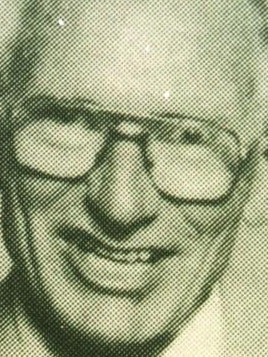
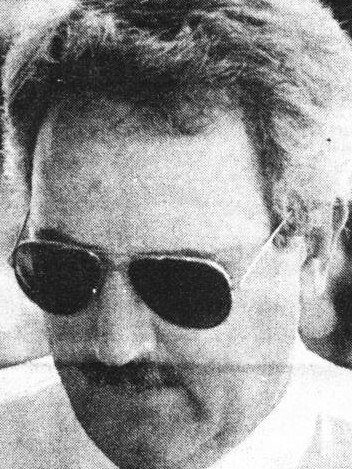
Those “someones” were paedophiles Kevin Lynch — a counsellor at St Paul’s between 1989 and 1997 — and Gregory Robert Knight, a music teacher at St Paul’s between 1981 and 1984.
Dr Browning wasn’t principal at the time of the abuse and was not required to attend the hearing, but he choose to sit in. To listen. To understand. To find a way forward after the unconscionable past.
St Paul’s wasn’t the only prestigious school embroiled in the sordid affair.
Lynch was a teacher and counsellor at Brisbane Grammar School between 1973 and 1988.
When the commission handed down its final report in February 2017, both schools were lambasted for failing in their duty to protect students.
More should have been done, and students should have been believed.
Dr Browning agrees.
Speaking to Qweekend as his new book Principled: 10 Leadership Practices for Building Trust is released, he says the reputation of a school, or any organisation, pales against the rights of an individual to feel safe.
“It is staggering to think that these boys were not heard or someone didn’t notice,” he says.
“Our primary responsibility as educators is to protect young people and we are entrusted with them by their parents … we have to notice changes in a child’s behaviour and ask the question, ‘Are you OK, what’s going on?’.
“The reputation of the institution is worthless if you’re causing pain and damage to a person.
“Sadly and naively in the Church’s case, these perpetrators sought forgiveness of their superior, and promised they wouldn’t commit again, but the reality is they do commit again, and they need to be held accountable.
“Lynch committed for such a long period of time and caused untold damage to hundreds of kids.”
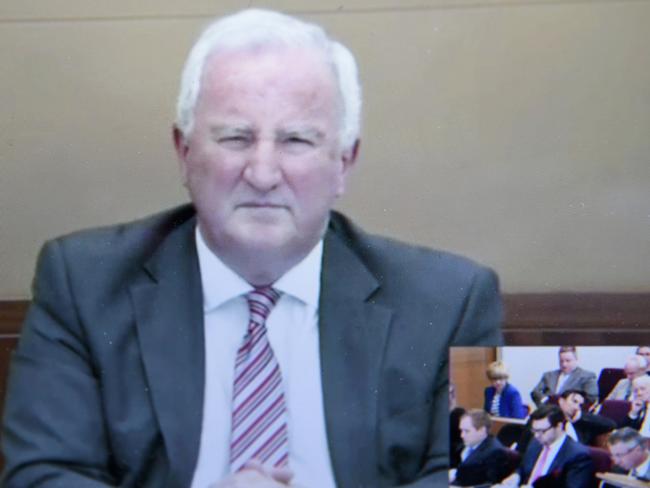
Lynch suicided in 1997, a day after he was charged with nine counts of child sexual abuse.
When Knight resigned from St Paul’s in 1984 he was given a favourable reference by then principal Gilbert Case who, the commission found, told the students they were lying and threatened to punish them if they persisted with the allegations.
Knight went on to teach at Darwin’s Dripstone High School where its principal contacted police after an abuse complaint.
This led to Knight being convicted in 1994 of 15 charges, including two of carnal knowledge, against five boys. He was sentenced to eight year’s jail, with a three-year non-parole period.
Knight was jailed again for three years in 2005 on more than 20 counts of indecently dealing with a St Paul’s student in 1984.
When Dr Browning took the top job at St Paul’s in 2008, he was confronted by ongoing ramifications of a related scandal.
The school community was haemorrhaging after the forced resignation in 2003 of Australia’s governor-general Dr Peter Hollingworth, who had mishandled abuse allegations when head of the Diocese of Brisbane during the years Lynch and Knight were employed at St Paul’s.
Dr Hollingworth had also been part of a panel which promoted Gilbert Case to executive director of the diocese’s Anglican Schools Office in 2000, as investigations continued into paedophile activity under Case’s 21-year reign at St Paul’s.
For Dr Browning, coming to St Paul’s after a halcyon run as founding principal of Burgmann Anglican School in the ACT, was a rude shock.
“I was struck by a total absence of trust, nobody trusted each other or the boss, everyone was looking over their shoulder or (at) who might be accused of something,” he says.
“I knew a little about what happened (with Dr Hollingworth) in 2003 … you kind of think it is consigned to the history pages but when I arrived the culture was so different, so toxic.
“It affected the way teachers worked, and it affected learning in the classroom.”
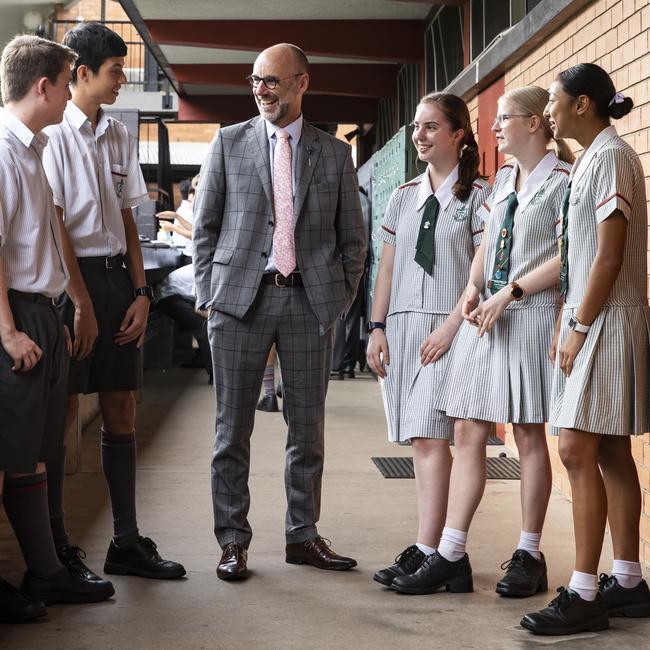
Teachers were “protective of their patch” and avoided unnecessary interactions with students.
Staff turnover in the previous year was 30 per cent.
Dr Browning knew he had a huge task ahead. The trouble was, he wasn’t exactly sure how to rebuild trust that had been so comprehensively fractured.
He began slowly, cautiously.
Practical steps included making himself visible on the school grounds and more accessible to staff and students.
“Can you believe you had to get past three receptionists and two locked doors to get to see the headmaster? Even the building design spoke of mistrust, and there was a room for confidential photocopying. Where’s the transparency?”
Dr Browning spent three months listening to teachers in a staff of 220, asking what they’d like to improve.
He undertook a PhD at QUT to identify specific practices that respected transformational leaders use to create and maintain trust, and he did lots of reading and reflection.
Dr Browning’s efforts paid off.
Last year St Paul’s was named Australian School of the Year in the Australian Education Awards.
In the same awards in 2018, Dr Browning was crowned School Principal of the Year (non-government award), and St Paul’s took out the categories of innovation in curriculum design, professional development, and strategic plan.
“It hasn’t been easy, in fact it took about eight years, much longer than I thought it would to turn the culture around,” he says.
“In any organisation if you ask people, ‘Do you trust your boss?’, most say no, but the ability of an organisation to improve and innovate is severely diminished if there are low levels of trust.”
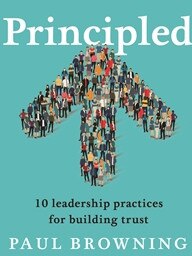
Under Dr Browning, St Paul’s has introduced an impressive middle management model to upskill teachers in key 21st century pedagogies.
It has opened a centre for research, innovation and future development which has been visited by leaders from more than 150 schools.
Cambridge University has acknowledged St Paul’s as one of the top 100 innovative learning organisations in the world.
And Dr Browning himself has been internationally recognised, invited by the Bill and Melinda Gates Foundation and the UK’s Sutton Trust to speak at an education summit in Washington DC.
He says without a healthy culture based on trust, none of the school’s achievements would have been possible.
“If the culture’s wrong, no strategy will work.”
He might appear to be a born educator, but like many young people, Paul Browning had no idea what he wanted to do when he left school.
Graduating from Chevalier College, a Catholic co-educational school in Bowral, in NSW’s Southern Highlands, he took a gap year.
“I’d started to teach Sunday school at the local church and I saw how I could positively impact the lives of young people, and I fell into teaching.”
With an education degree from the University of Wollongong, Dr Browning became a primary teacher at Gib Gate, an independent school in Mittagong, just north of Bowral.
He loved it, and over the years taught the children of many famous residents including rocker Jimmy Barnes, Mark Opitz (who produced AC/DC, Cold Chisel and INXS) and Billy Birmingham, aka The 12th Man.
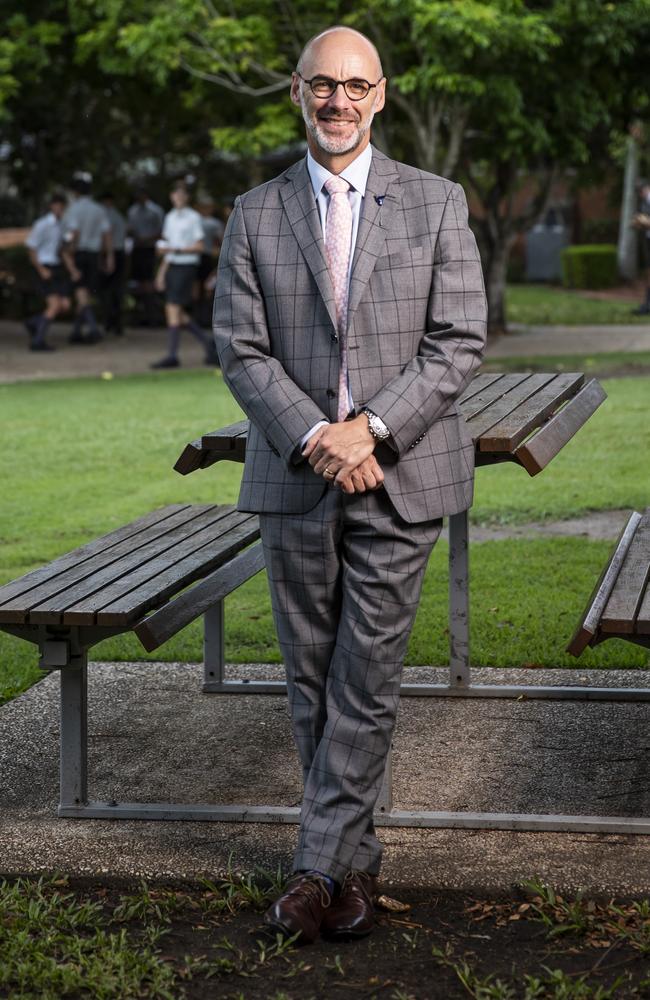
After nine years, he left to open Burgmann Anglican School in 1998, growing it from a “green field site to a preschool to Year 12 school spread over two campuses”.
A decade later, he moved to Brisbane for the St Paul’s challenge, with his family – early childhood teacher wife Rebecca, now 50, and children Alexander, now 25 and completing a PhD in mathematics at QUT and Millicent, 23, who is studying interior architecture at the same institution.
He hasn’t regretted the decision, but admits it’s been tougher than expected.
Likening running an independent school to being the CEO of a large corporation, he is responsible to a board for strategy, finances, human resources, governance and capital infrastructure and, naturally, the development of students, curriculum and pedagogy.
But Dr Browning also had to cure an insidious hangover he had no hand in making.
Of the scandals that rocked the school to its core, he says: “It’s not the sort of work you sign up to do when you become a principal … it was a long, protracted incident, yes, I wasn’t responsible, but I accepted responsibility for it.”
Part of that acceptance was opening communication with victims of child sexual abuse in the 1980s and 1990s.
Dr Browning has spoken with dozens of wounded men, including Brenden Sheehan, a former student who wrote a blog under the pseudonym Archie Butterfly.
On October 6, 2015, a few weeks before the Royal Commission hearing, Mr Sheehan, then 46, revealed that he had been drugged and sexually abused as a 13-year-old by a teacher (Knight) and a senior student at St Paul’s.
That student was Greg Masters, by this stage Master-in-Charge of Swimming at Brisbane Grammar School.
The day after learning of the accusations, BGS stood down Masters. The following morning, Masters was found dead by suicide.
It was another blow to the culture of trust Dr Browning had been working so hard to create.
Past students and their families, in particular, were looking to him for justice, and ultimately, healing.
As other students broke their silence, they wanted to know if Dr Browning would try to cover up the ugly truth as previous heads had done, or bring it to light.
He chose the latter.
Dr Browning admits that interacting with victims was unsettling.
“You do get a little frightened – you’re initially communicating with them via email and their anger is palpable.
“I’d not seen anger like it, and it’s totally understandable, and some directed it at me because they didn’t know where to direct it.
“One victim would text me up to 100 times a night, that how traumatised they are.
“Their biggest pain is that they weren’t listed to, they weren’t heard, they’re telling the truth, their story, it happened to them.”
On the final day of the Royal Commission hearing, Dr Browning asked if he could make an apology.
“Until that point the room had been filled with anger, you could physically feel it, but then the mood turned to sorrow and grief.
“The commissioner then called for a break when I’d finished, and a victim from (Brisbane) Grammar embraced me, and he said to me, ‘I’m here for those people who don’t have a voice any more’.
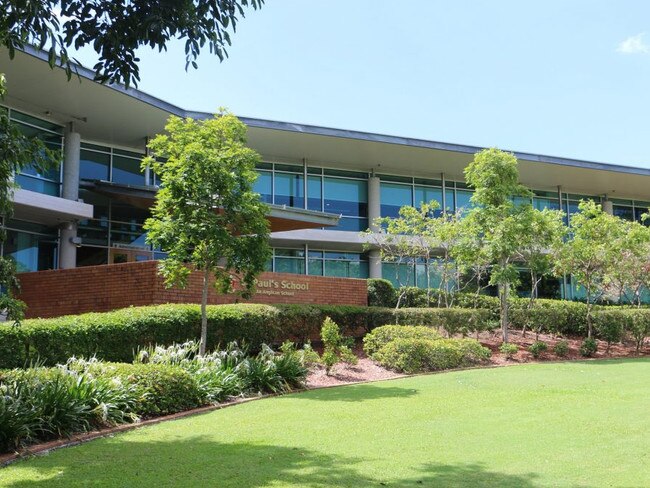
“That was a really hard thing to hear, the number of men who ended their life because of the pain … horrendous.”
In February 2016, Mr Sheehan arrived at St Paul’s following lengthy email exchanges with Dr Browning.
It was the first time since 1984 that Mr Sheehan had been on the grounds.
The account of their face-to-face interaction is one of the reflections in Dr Browning’s book, and a powerful example of how trust can help people, and organisations, move forward.
Dr Browning says writing Principled took only three months, largely because of the research he’d completed in his doctorate, but also through what he experienced during that harrowing period of the Royal Commission.
“The words just poured out of me because I’d written them before in my journal,” he explains.
“Most of us think that being a good leader means being a person of integrity but it’s more than being honest.
“It requires the ability to listen and listen really well, the willingness and the courage to say sorry and the courage to actually fix it, and what happened at St Paul’s is a prime example – it happened, we can’t ignore it, and we need to allow people to have their say, and to assure them it won’t ever happen again.”
10 TIPS FOR BUILDING TRUST
1. LISTENING: Good listeners speak for no more than 20 per cent of the time, and it is mostly to clarify or reflect what the speaker is saying. Stop interrupting, talking over or offering advice.
2. ADMITTING MISTAKES: Failing to do so looks like arrogance or narcissism. Displaying vulnerabilities, both personally and professionally, engenders employee admiration and trust.
3. OFFERING TRUST: Allow employees to do their job. No-one likes being micromanaged. But they do like feeling appreciated and supported.
4. CONSULTATIVE DECISION MAKING: Captain’s calls should rarely be used. Give people the chance to be part of the decision making process and explain the final decision.
5. PROVIDING AFFIRMATION: Thank others for what they do. It might be public acknowledgment at staff briefings, sending emails or handwritten notes, or simply speaking privately.
6. VISIBILITY: Don’t sit in your office. Get out and listen to the ‘pulse’ of the organisation, to people’s stores. Being face-to-face allows both parties to better understand each other.
7. DEMEANOUR: If a leader is unpredictable, erratic or prone to losing their temper, others will feel threatened. Even under great stress, remain calm and in control.
8. COACHING OR MENTORING: Coaching is task-oriented; mentoring relationship-driven. Both matter. Never suggest the solution. Help a person recognise their preferred action.
9. CARING: Express concern over wellbeing, understanding another’s viewpoint, speak warmly to staff to create a sense of safety.
10. KEEPING CONFIDENCES: It is a privilege to be trusted with people’s personal joys or despairs. Forgo the power kick that sharing that knowledge might bring, and if you feel trusted information should be shared, always ask permission first.
Principled by Dr Paul Browning, published by UQP ($33), is out now

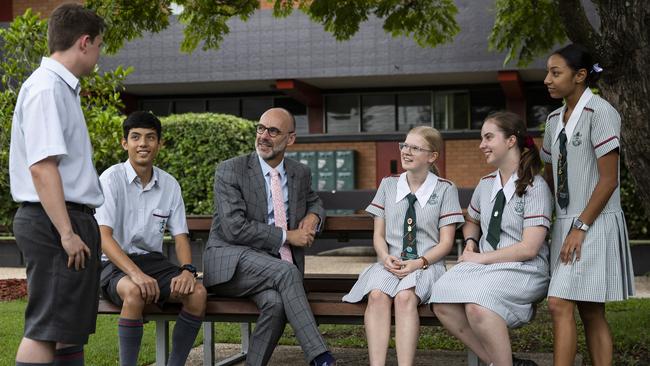
Add your comment to this story
To join the conversation, please log in. Don't have an account? Register
Join the conversation, you are commenting as Logout
I polled my lady friends – we all agree this gives us the ick
Women are now being allowed to do this – the only problem is they don’t want to be anywhere near it.
Only now does my lifelong stalker finally have a name
Since Kelli Armstrong was a little girl, she has been stalked by a mysterious shadow attacking her mind and spirit. At last, 40 years on, she has a diagnosis. WARNING: DISTRESSING CONTENT